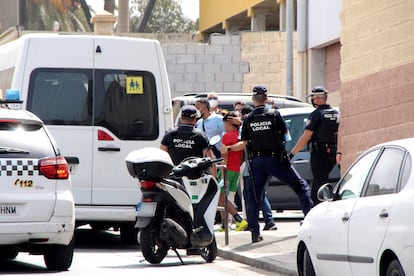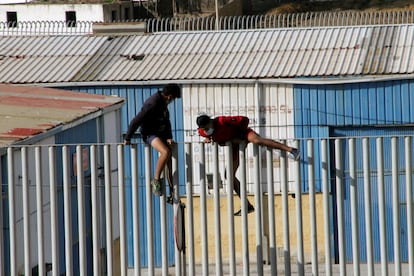Spain starts deporting migrant minors from Ceuta despite fierce opposition
The Spanish government has reached an agreement with Morocco to expel 740 of the youngsters who entered irregularly in May, but critics say the move violates the law

Spain has begun to deport migrant minors who crossed irregularly into the Spanish exclave city of Ceuta in North Africa in May, when lax border controls in Morocco saw more than 10,000 people breach the territory.
Authorities estimate that between 2,000 and 3,000 migrants were among this group. Many of the youngsters were sent back as “refusals at the border,” a euphemism for irregular expulsions or express deportations, while others voluntarily returned to Morocco. An indeterminate number – close to 200 – are living on the street, while 740 are currently in emergency shelters.
On Friday, the Spanish government reached an agreement with Morocco to deport the 740 migrant minors under state care from Ceuta. That day, the first 15 migrant minors were taken by bus back to Morocco. Another 30 youngsters have been expelled since then.

According to the Spanish Interior Ministry, the deportations are being carried out in accordance with a 2007 agreement signed with Morocco to facilitate the repatriation of unaccompanied minors. But although this legal tool has been in force for more than 10 years, it has rarely been used, according to sources from the Interior Ministry.
The move to deport the 740 migrant minors in Ceuta has been met with a storm of criticism. The public prosecutor has opened an investigation and is demanding the Interior Ministry provide detailed information on the expulsions on a “case by case” basis. On Sunday, the public prosecutor for minors in Ceuta tried to stop the deportation of nine minors, at the request of the NGO Coordinadora de Barrios (Neighborhood Coordination), but the motion was rejected on the grounds that the youngsters had already been handed over to Moroccan authorities.
The deal has also opened a new rift within the Spanish government, which is headed by a coalition of the Socialist Party (PSOE) and junior partner Unidas Podemos. Social Rights Minister Ione Belarra, of the latter party, has expressed her opposition to the move to Interior Minister Fernando Grande-Marlaska (PSOE), and does not want to be associated with the operation.
Many of these children who are being deported are in a situation of riskAndrés Conde, the managing director of Save the Children in Spain
The government is also facing opposition from human rights groups and NGOs, which say the move violates two laws. The first is the United Nations Convention on the Rights of the Child, which was ratified by Spain in 1990, and outlines that a child has the right to be heard during all legal and administrative processes that affect them. Diego López Garrido, a professor of constitutional law, says that international treaties such as this one cannot be “modified either by internal rules or agreements adopted.”
The second is Spain’s immigration law, which was passed in 2000. Article 35.5 of this law states that protection services and the public prosecutor must issue a report before a minor can be deported – a process that has not happened.
“The legislation is very clear on this subject,” said Carmen Molina, the head of children’s policy at the UN’s children’s agency Unicef, on Friday. “It’s incredible to us that this is happening, when we understand that they are carrying out evaluations of the minor’s general interest and that they are not finished.”
“Many of these children who are being deported are in a situation of risk,” warned Andrés Conde, the managing director of Save the Children in Spain, on Friday. His organization has interviewed around 350 of the minors who crossed into Ceuta in May and collected testimonies of sexual violence, work exploitation, forced marriage and criminal and human trafficking networks.
But despite the fierce criticism, the Interior Ministry has no plans to halt the deportations. “We are convinced that [repatriation] is being done correctly and according to the law,” said spokespeople from the department on Sunday.

Since the deal with Morocco was announced, tensions in the emergency shelters for minors have been running high. According to sources from several humanitarian organizations and the police, around 80 youngsters escaped the centers on Saturday.
“It’s a normal survival mechanism, understandable in a child who is afraid to go back to their country of origin,” said Laura Bodendörfer, a Unicef official based in Ceuta.
Many of the escapees, faced with no food or a place to sleep, decided to return to the shelters.
Diplomatic crisis with Morocco
Spain’s deal with Morocco comes after a months-long diplomatic spat between the two countries. The conflict was sparked by Spain’s decision to allow Brahim Gali, the 73-year-old leader of the Sahrawi liberation movement Polisario Front, into the country for medical treatment while he was suffering from Covid-19. Also compounding the situation was former US president Donald Trump’s recognition of Moroccan sovereignty over Western Sahara in December of last year – a move that prompted Rabat to pressure Spain into following Trump’s footsteps.
The crisis came to a head in May, when Moroccan forces allowed thousands of migrants to cross the border into Ceuta. Since then, relations have slowly improved. Controls at the border have resumed, with Morocco preventing groups of migrants from jumping the border fence at the exclave city of Melilla on at least four occasions since August.
With reporting by Miguel González, Luis de Vega, Fernando J. Pérez and F. Javier Barroso.
English version by Melissa Kitson.
Tu suscripción se está usando en otro dispositivo
¿Quieres añadir otro usuario a tu suscripción?
Si continúas leyendo en este dispositivo, no se podrá leer en el otro.
FlechaTu suscripción se está usando en otro dispositivo y solo puedes acceder a EL PAÍS desde un dispositivo a la vez.
Si quieres compartir tu cuenta, cambia tu suscripción a la modalidad Premium, así podrás añadir otro usuario. Cada uno accederá con su propia cuenta de email, lo que os permitirá personalizar vuestra experiencia en EL PAÍS.
¿Tienes una suscripción de empresa? Accede aquí para contratar más cuentas.
En el caso de no saber quién está usando tu cuenta, te recomendamos cambiar tu contraseña aquí.
Si decides continuar compartiendo tu cuenta, este mensaje se mostrará en tu dispositivo y en el de la otra persona que está usando tu cuenta de forma indefinida, afectando a tu experiencia de lectura. Puedes consultar aquí los términos y condiciones de la suscripción digital.








































